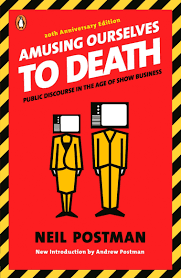Amusing Ourselves to Death: Public Discourse in the Age of Show Business
One could easily dismiss an almost 40 year old book about “modern” media as completely outdated by now. How could one man’s rant on 1980s television be relevant in a world of TikTok, Snapchat, and Instagram? However, when the late Neil Postman set out to examine how strongly culture and society are shaped by their media landscape, he looked far beyond the immediate implications of “The A-Team” or “Dallas”.
With impressive lucidity, Postman foresaw the danger that liberal democracies, the American first and foremost, were at the brink of drifting off into a subdued state of suppression. Serfdom would would not, however, come in the form an omnipotent Orwellian surveillance state. Quite the contrary, he argued, America was on its way towards a Huxleyan dystopia, one in which the populace was free in principle, but so preoccupied with shallow entertainment that it had lost all interest in civil discourse and meaningful political discussion. Society, he said, was literally about to amuse itself to death.
Over the course of 200 pages, Postman builds a coherent argument about the way in which mass media had demolished societies’ ability to have profound collective conversations on important topics. A prime reason he states for this unfortunate development is McLuhan’s observation that a medium, in this case his in the peculiar form of the entertainment-focused television news broadcast, constrains what type of content it allows to transmit. It is hardly possible for example, in the span of a 30 second segment on the Vietnam War, to examine even the most superficial details about the Vietcong, the grounds for the conflict, or wether or not Americans had any business fighting in it. But back in the heyday of long-form journalism and feature-length debates, say in the 18th and 19th century, ample room had to be alloted to background, logic, and coherence. Postman underscores this with snippets of debates and articles by rhetorical titans such as Abraham Lincoln or Daniel Webster.
The fact that society, by and large, has survived Postman’s “Age of Show Business”, could of course be used as grounds to dismiss his argument. Television had not, in fact, numbed us so completely that we sleepwalked into dictatorships on a large scale. But many of his objections against TV hold true today and are only exemplified by its offspring, including social media. Their impact on our attention span, on our ability to concentrate, and on our liberal democracies at large is possibly even more profound than what he foresaw about television. On the contrary, modern media have even fostered a small renaissance of the profound intellectual discourse that Postman was longing for. Without a doubt, he would be awed by some of the great debate formats that thrive on various podcasts, for example.
Is Postman relevant today? Yes, and I would argue more than ever. But, reader beware, many of his references are not so easily deciphered for someone who is not immersed in 1980s television trivia. However, the overarching themes he’s pointing to have to be part of any criticism of our modern-day media environment as well.
